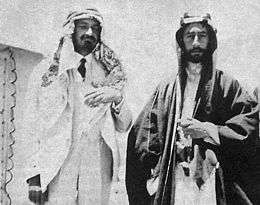Zionist Commission


The Zionist Commission for Palestine was a group chaired by Chaim Weizmann, president of the British Zionist Federation[1] following British promulgation of the pro-Zionist, Balfour Declaration of 1917. The Commission was formed in March 1918 and went to Palestine to study conditions and make their recommendations to the British authorities.[2] It consisted of Weizmann with Israel Sieff as secretary, and Joseph Cowen, Dr. M. D. Eder, Leon Simon from Britain; Commandante Levi Bianchini from Italy; and Professor Sylvian Levy from France. There were no representatives from America or Russia.[3]
The Commission reached Palestine on 14 April 1918; it ran into difficulties with the British military administration (OETA), which was far from sympathetic to Zionist aspirations. The Commission had gone to Palestine with the consent of the British Government and stayed there for some years.[4]
The Commission carried out initial surveys of Palestine and aided the repatriation of Jews sent into exile by the Ottoman Turks during World War I. It expanded the Palestine Office, previously founded by the ZO in 1908,[5] into small departments for agriculture, settlement, education, land, finance, immigration, and statistics.
In June 1918, representing the Zionist Commission, Weizmann traveled to southern Transjordan to meet Emir Feisal, during the British advance from the south against the Ottoman Empire in World War I. The intended purpose was to forge an agreement between Feisal and the Zionist movement to support an Arab Kingdom and Jewish settlement in Palestine, respectively. Neither side considered it necessary to consult the wishes of the Palestinian Arabs.[6]
Arab opposition to establishing a national home for the Jewish people in Palestine was voiced by the newly formed Muslim-Christian Associations and the Palestine Arab Congress. On 19 April 1920, elections were held for the Assembly of Representatives of the Palestinian Jewish community.[7] The Palin Report 1920 on the April riots, submitted in August 1920, though never published, was critical of both sides. By the time the Report was presented, the British Occupied Enemy Territory Administration had been replaced by a High Commissioner, Sir Herbert Samuel. Weizmann became president of the Zionist Organization (ZO) in 1920. Also in 1920, Menachem Ussishkin (who had made aliyah to Palestine in 1919) was appointed head of the Zionist Commission.[8]
Further rioting took place in Jaffa between 1 and 7 May 1921. In October 1921, the Haycraft Commission of Inquiry laid the blame for the Jaffa riots of May 1921 on the Arab community, but otherwise the report was not acted upon.
In 1921, the Zionist Commission became the Palestine Zionist Executive, which was designated the Jewish Agency for the purpose of Article 4 of the Palestine Mandate,[9] to advise the British mandate authorities on the development of the country in matters of Jewish interest.[10] In 1929, the Palestine Zionist Executive officially became the Jewish Agency for Palestine at the 16th Zionist Congress, held in Zurich.
References
- ↑ Plans Zionist Commission, New York Times, Feb. 13, 1918
- ↑ History of Zionism, 1600-1918 by Nahum Sokolow
- ↑ Cohen, Aharon (1970) Israel and the Arab World. W.H. Allen. ISBN 0-491-00003-0. pp.131,132
- ↑ Patriot, Judge, and Zionist
- ↑ Walter Laqueur, A History of Zionism, p153
- ↑ 'The Letters and Papers of Chaim Weizmann', Weisgal M.W. (ed.), Israel University Press, 1977, pp. 197-206.
- ↑ Palestine Through History: A Chronology (I) Archived February 12, 2012, at the Wayback Machine. The Palestine Chronicle
- ↑ "Menachem Mendel Ussishkin". The complete guide to Israeli postage stamps from 1948 onward. Boeliem.
- ↑ Article 4 of the Mandate provided for "the recognition of an appropriate Jewish Agency as a public body for the purpose of advising and co-operating with the Administration of Palestine in such economic, social and other matters as may affect the establishment of the Jewish National Home and the interests of the Jewish population of Palestine." - per Israel Pocket Library (IPL), "Zionism". Keter, 1973. ISBN 0-7065-1326-6. p. 141.
- ↑ Palestine Jewry and the Arab Question, 1917 - 1925, by Caplan, Neil. London and Totowa, NJ: F. Cass, 1978. ISBN 0-7146-3110-8.